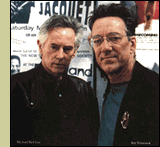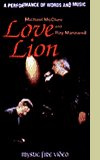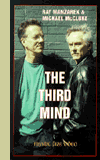|
( Return to Info Main Page )
( The
Michael McClure / Ray Manzarek Metasite )
Love Lion - Michael McClure and Ray
Manzarek
"Poetry
is a muscular principle and it comes from the body it is the
voice's athletic action on the page and in the world." -
Michael McClure
"Music is
the purist artform. It deals only with vibrations, existing only
for the moment that it's played. And then it's gone." -
Ray Manzarek
 Michael McClure arrived on the scene
of American poetry in October 1955 when, at age 23, he was among
the handful of poets to read at The Six Gallery, a converted
auto-repair shop in San Francisco's Marina District. That night,
along with Gary
Snyder,
Phillip Lamantia, Phillip Whalen, Kenneth Rexroth and Allen Ginsberg, McClure helped usher in the
"Beat Movement" - the last time a group of writers
joined together to share a common vision and express the sorrows
of a restless generation. Michael McClure arrived on the scene
of American poetry in October 1955 when, at age 23, he was among
the handful of poets to read at The Six Gallery, a converted
auto-repair shop in San Francisco's Marina District. That night,
along with Gary
Snyder,
Phillip Lamantia, Phillip Whalen, Kenneth Rexroth and Allen Ginsberg, McClure helped usher in the
"Beat Movement" - the last time a group of writers
joined together to share a common vision and express the sorrows
of a restless generation.
More than 40
years later, McClure is still making roads
for American poets - this time with "Love Lion," a
70-minute performance video of his poems backed by the piano
of Ray
Manzarek
who, with Jim Morrison, founded the rock band The Doors.
 "Love Lion," issued by Mystic
Fire Video in conjunction with Island Visual Arts, was recorded
at the Bottom Line rock club in Greenwich Village. Mystic Fire
opened its doors in 1985 to provide an outlet for alternative
videos. The company currently boasts a catalog of more than 120
cassettes, many of which confront social and cultural issues.
"Love Lion" was produced and directed by Mystic Fire
president Sheldon Rochlin (with Maxine Harris). Rochlin had seen
a performance by McClure and Manzarek in Canada and was struck by the passion
and energy of their show. A short time later the duo agreed to
let Rochlin film a performance, and "Love Lion" was
born. "With our two names up there, some people might come
to a reading thinking they'll see Jim Morrison reincarnated,"
McClure says, "but a lot
more are just as anxious to see what we sound like - to see exactly
what we're doing." "Love Lion," issued by Mystic
Fire Video in conjunction with Island Visual Arts, was recorded
at the Bottom Line rock club in Greenwich Village. Mystic Fire
opened its doors in 1985 to provide an outlet for alternative
videos. The company currently boasts a catalog of more than 120
cassettes, many of which confront social and cultural issues.
"Love Lion" was produced and directed by Mystic Fire
president Sheldon Rochlin (with Maxine Harris). Rochlin had seen
a performance by McClure and Manzarek in Canada and was struck by the passion
and energy of their show. A short time later the duo agreed to
let Rochlin film a performance, and "Love Lion" was
born. "With our two names up there, some people might come
to a reading thinking they'll see Jim Morrison reincarnated,"
McClure says, "but a lot
more are just as anxious to see what we sound like - to see exactly
what we're doing."
The association
between McClure and Manzarek dates back to the late 1960s, when The
Doors were beginning to gain popularity. Although McClure initially was attracted
to the dark, brooding poetics of Doors lead singer/songwriter
Morrison (he eventually would help Morrison publish his first
book of poems, "The Lords and the New Creatures" in
1967). the poet quickly established a bond with Manzarek, based on a mutual kinship
to jazz, art and history. Their friendship has grown deeper over
the years, culminating in their first performance in 1987.
The spoken-word
"concerts" that "Love Lion" immortalizes
are probably best defined as a union between language and sound.
Although each number is rehearsed, much of the outcome is left
to improvisation. "It resembles jazz," McClure says, "like what
Jack
Kerouac
was doing with Steve Allen in the '50s; there's a lot of finesse
to it. And Ray's a one-man band: Sometimes his playing sounds
to me like Russian pianist Alexander Scriabin. Other times he's
rock, boogiewoogie, blues, Bach."
After McClure has finished a poem,
he sends a draft and a taped reading to Manzarek (still living in Los Angeles), who puts
it to music, weaving a melody around the words. Manzarek says, "When I first
get something in the mail from Michael I look for key words and phrases that
can put me in the place where the poem lives. And then I attempt
to create music from that place. What I do is a combination of
jazz, classical and technical piano playing - 50 percent is planned
out and the other half is pure spur-of-the-moment, wherever the
mood takes me. Actually, from that standpoint, it's a very easy
collaboration."
Onstage, McClure sometimes paces like
a wounded cat - he looks pensive, almost shy - while Manzarek is buoyant, swaying,
guided by the hooves of his piano. But when the camera retreats
and catches them in a single frame, we see both men with the
same mission - to meld their mediums into one so the words are
no longer separate from the music, but instead, built into the
rhythms and supple layers of sound.
Manzarek's playing is truly eclectic,
covering everything from bop to blues. Many times on "Love
Lion" you almost expect to see blood splash across the piano
keys as his fingers bounce and fly, improvising in the grand
tradition of Charlie "Bird" Parker, driving the audience
until they're out of breath.
"There's
a correlation to the ancient Greeks in what we're doing,"
Manzarek says. "What we're
doing is ancient: a poet reading and somebody playing a lute
or beating on a drum. It's someone pounding on a log while someone
else recites invocations."
"Love Lion"
is a simple video - no gimmicks, no hype; the visual images are
secondary to the words and music. As the two melt together -
the soft fibers of McClure's voice into the subtle
strains of Manzarek's piano - the poems come
to life. (Texts to several of the pieces are printed in "Rebel
Lions," McClure's 14th book of poetry,
issued by New Directions last spring).
A myriad of themes
Intersect the selections that comprise the video: "Maybe
Mama Lion" focuses on man's separation from his primal nature;
"Czechoslovakia" is about spiritual wars that lead
to conflicts between people and countries; "Rose Rain"
details the splendor of love in only 16 lines; "Indian"
examines man's loss of identity amid the evolution of a world
turned plastic.
Throughout every
number, McClure and Manzarek command a social consciousness - demanding
that we become aware of our decaying world, reclaim our savage
instincts and save our souls. Unlike most popular songs, the
audience is forced to participate - not through physical action
(dance), but with their minds.
"Poetry
is the way we extend our inner lives," McClure says. "We stand
on poetry - like a steppingstone in a torrent - and are more
free."
First published
in The San Francisco Chronicle, Poet, Pianist Combine Talents
on 'Love Lion', John Aiello
Also Available
from Mystic Fire Video, "The Third Mind".
 This
is the compilation of concert footage and interviews, directed
by William Tyler Smith. Kevin Thomas, of the Los Angeles Times,
called this film "...an incisive and engaging exploration
of McClure and Manzarek's collaboration...
in which we can both enjoy them in performance and get to know
how they feel about their collaboration. This
is the compilation of concert footage and interviews, directed
by William Tyler Smith. Kevin Thomas, of the Los Angeles Times,
called this film "...an incisive and engaging exploration
of McClure and Manzarek's collaboration...
in which we can both enjoy them in performance and get to know
how they feel about their collaboration.
There are plenty of insights from other Beat era figures, including
the late Allen
Ginsberg,
who sees their working together as 'a ripening of good karma.'
Diane
di Prima,
quoting William
Burroughs,
remarks that a good collaboration results in "a third mind."
Lawrence Ferlinghetti describes McClure's poetry as "a beautiful cry of the
beast," and McClure's soaring poems celebrate
the human spirit and express a fervent concern for the preservation
of the environment. Of his widely varied accompaniment, Manzarek
combines "a little collision" - i.e., occasional counterpoint
- with 'making love to the words." The Third Mind has lots
of energy and style, and it is an altogether stimulating work.
( The
Michael McClure / Ray Manzarek Metasite )
Ray Manzarek
played keyboards with The Doors. He has recorded several albums
including The Golden Scarab, a jazz/ rock cycle with Tony Williams
and Larry Carlton, and a collaboration with Philip Glass of Carl
Orff"s Carmina Burana. He was the producer of the punk rock
group X. Manzarek directed videos of The Doors; Live at Hollywood
Bowl, The Doors: Dance on Fire, and The Doors: Soft Parade.
|

